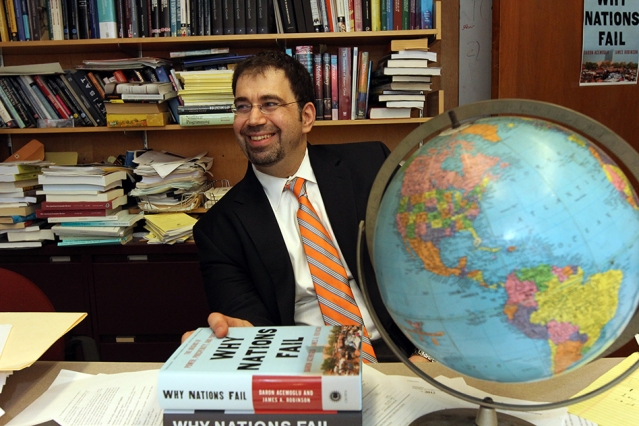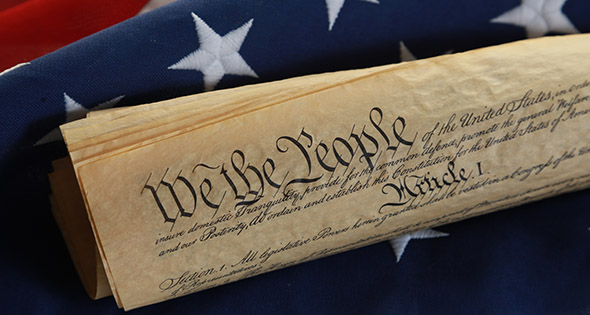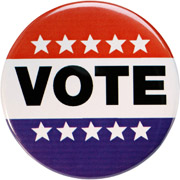ELECTION INSIGHTS 2018
Research-based perspectives from MIT
Daron Acemoglu | On Civil Society and Democracy
Elizabeth and James Killian Professor of Economics

"We, the people, are the last defense for democracy."
ELECTION INSIGHTS 2018
Research-based perspectives from MIT
COMMENTARY
Excerpt from an article first published in Foreign Policy
Reprinted with permission of the publisher
In the second half of the 20th century, the main threat to democracy came from the men in uniform. ...Far from most thinkers’ minds was ...a different threat to democracy — personal rule, in which civilian state institutions such as the bureaucracy and courts come under the direct control of the executive. ...
Yet today we are coming to discover that contemporary democracy has its own soft underbelly — not so much a weakness against a cabal of colonels, ...but the gutting of state institutions and the incipient establishment of a variant of personal rule. Examples of personal rule include Venezuela under Hugo Chavez, Russia under Vladimir Putin, and Turkey under Recep Tayyip Erdogan. ...Now, these examples are poised to include America under Donald Trump.
Trump appears to...have little respect for the rule of law or the independence of state institutions, which he has tended to treat as impediments to his ability to exercise power. He has a blurred vision of national and personal interests. And he has little patience with criticism and a long-established strategy of rewarding loyalty, which can be seen in his high-level appointments to date. This is all topped by an unwavering belief in his abilities.
Overconfidence in American institutions
What makes America vulnerable to being blindsided by such a threat is our unwavering — and outdated — belief in the famed strength of our institutions. Unfortunately, many of these still won’t be much help against the present threat. Not only are America’s institutions particularly ill-equipped, in this moment, to stand up against Trump; in some cases, they may actually enable him.
The first bulwark against any sort of personalizing threat to U.S. institutions is the country’s vaunted separation of powers. The legislature, elected separately from the executive, is supposed to stop in its tracks any president attempting to exceed his authority; it has indeed acted in this fashion during frequent periods of divided government. ...Their capacity to do this, however, is ...[hindered by] a historic rise in polarization between Republicans and Democrats and a pronounced shift toward party discipline.
Consequently, as political scientists Nolan McCarty, Keith Poole, and Howard Rosenthal document in their book Polarized America, House members and senators are now very unlikely to deviate from their party line. ...Such a rise in partisanship comes at the worst possible time, just as these protections are needed most. ...
The check on presidential power from an independent judiciary, the second leg of the separation of powers stool, is also unlikely to hold up. In truth, judicial independence in the United States has always been somewhat precarious, dependent on norms much more than rules. The president not only appoints justices to the Supreme Court and top federal judges, but also controls the Department of Justice through his attorney general. Any institutional resistance to inappropriate nominees would only be offered up by Congress, which, as discussed, seems poised to take Trump’s machinations lying down. And so the judicial institutions, too, are headed toward pliancy. ...
But America’s weakest point when it comes to resisting personal rule may lie in the executive’s unique relationship with the institution that makes up the very heart of government: the bureaucracy itself. In many other countries, such as the United Kingdom and Canada, where most of the bureaucracy and high-level positions in the judiciary are non-partisan civil servants, state institutions can go about the business of governing while remaining mostly immune to executive attempts to establish personal rule.
Not so much in the United States, where Trump is appointing his people to oversee 4,000 high-level posts in the civil service and the judiciary, ...essentially shaping a bureaucracy ready to do his personal bidding. This is the sort of power that the likes Chavez, Putin, and Erdogan had to acquire more slowly.

"What is written in a constitution can take a nation only so far unless society is willing to act to protect it. Every constitutional design has its loopholes, and every age brings its new challenges, which even farsighted constitutional designers cannot anticipate. We have to keep reminding ourselves that the future of our much-cherished institutions depends not on others but on ourselves, and that we are all individually responsible for our institutions."
An imbalance of power?
Why is the United States so defenseless in the face of the Trump threat? Because, to a large extent, the Founding Fathers wanted it this way. ... As Woody Holton recounts in Unruly Americans and the Origins of the Constitution, despite the emphasis on the separation of power in the Federalist Papers, the main struggle that Alexander Hamilton, James Madison, and George Washington were engaged in was [a struggle] to build a strong federal government and reduce the excessive powers granted to the states in the Articles of Confederation, which had left the country in close to complete chaos. The separation of powers was meant only as a counterbalance to this strong presidency.
In this, they succeeded, but only partially. The U.S. president is indeed hugely powerful in the extent to which he can shape not only foreign but also domestic policy, especially if he can get Congress behind him. However, his hands are tied when it comes to the states’ rights, a concession that the framers... [made] to give to powerful state representatives to garner enough support for the Constitution. This is the reason why some of the strongest resistance shaping up to Trump’s policies is already coming from states like New York and California, where governors have pledged to stand against his immigration policies....
But over time, the federal government has grown, as it has accrued, by necessity and choice, ever more responsibility in domestic and international politics. States, by contrast, have far less power than they did at the end of the 18th century. Massachusetts and Vermont can resist federal policies, creating, perhaps, little liberal policy bubbles. They can have very little impact, however, on the personalization of the country’s most powerful levers of government, including the federal judiciary, dozens of major agencies, trade and fiscal policy, and foreign affairs. Nor can they do much to influence the perception of the new direction of U.S. politics in the minds of Americans and the world…
The one true defense: Vigilance and protest
This leaves us with the one true defense we have: civil society’s vigilance and protest. In fact, this is not unique to the United States. What is written in a constitution can take a nation only so far unless society is willing to act to protect it. Every constitutional design has its loopholes, and every age brings its new challenges, which even farsighted constitutional designers cannot anticipate…
The lack — and in fact active discouragement — of direct social participation in politics is the Achilles’ heel of most nascent democracies. Many leaders of newly emerging nations in the 20th century, who professed as their goal the foundation of a democratic regime, all but prevented the formation of civil society, free media, and bottom-up participation in politics; their only use for it was mobilizing core supporters as a defense against other leaders seeking to usurp or contest power. This strategy effectively condemned their democracies to permanent weakness.
...The U.S. tradition of free, rambunctious journalism...should help us. Yet there are reasons to be concerned that this last brake on executive power may, too, fail.
Trump is in the process of being accepted and legitimized by American elites and the wider public.... [and] when the previously unthinkable becomes normalized, it is easy for many to lose, or at the very least ignore, their moral compass. How quickly Trump’s brand of anti-immigrant and anti-Muslim rhetoric, off-the-cuff foreign policymaking, and systematic mixing of family and state are becoming accepted is more than a cause for passing concern.
We have to keep reminding ourselves that we do not live in normal times, that the future of our much-cherished institutions depends not on others but on ourselves, and that we are all individually responsible for our institutions. If we lose them to a would-be strongman, we have only ourselves to blame. We are the last defense.
Suggested Links
About
Daron Acemoglu | MIT webage
Wikipedia entry
Recent Book
Why Nations Fail: Why are some nations rich and others poor?
"Acemoglu and Robinson's major thesis is that economic prosperity depends above all on the inclusiveness of economic and political institutions. Institutions are 'inclusive' when many people have a say in political decision-making, as opposed to cases where a small group of people control political institutions and are unwilling to change. They argue that a functioning democratic and pluralistic state guarantees the rule of law. The authors also argue that inclusive institutions promote economic prosperity because they provide an incentive structure that allows talents and creative ideas to be rewarded."
Reviews of Why Nations Fail
Review in The New York Times
News Stories
Story: All the Difference in the World
In Why Nations Fail economists Daron Acemoglu and James Robinson assert that above all else, political institutions — not culture or natural resources — determine the wealth of nations.
Awards
Daron Acemoglu wins BBVA Foundation Frontiers of Knowledge Award
Prolific MIT economist honored for path-breaking work.
Acemoglu wins Nemmers Prize
MIT economist granted award for ‘fundamental contributions’ on economics, politics and growth.
Acemoglu wins Clark Medal
Awarded to the best economist under the age of 40
How to Vote in Every State.
See video with info for your state — and vote!
